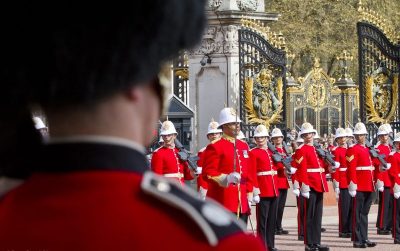Brexit Talks Turn Ugly on Gibraltar: UK Prepared to “Go to War With Spain”? Former Tory Leader

Featured image: Royal Gibraltar Regiment on parade outside Buckingham Palace in London (Photo: Defence Images)
Britain has said Spain can have no new powers over Gibraltar, as Brexit prompts hard talk on sovereignty, security, and borders.
“We will never enter into arrangements under which the people of Gibraltar would pass under the sovereignty of another state against their freely and democratically expressed wishes”, the British prime minister’s office said in a statement on Sunday (2 April).
The British defence minister, foreign minister, and the chief minister of Gibraltar issued similar comments in a debate prompted by the start of Brexit talks last week.
“Gibraltar is going to be protected all the way,” Michael Fallon, the defence chief, told the BBC on Sunday.
Boris Johnson, the foreign minister, said on Facebook:
“The UK remains implacable and rock-like in our support for Gibraltar.”
Fabian Picardo, the Gibraltar chief, told the BBC that life under Spain would be “absolutely awful”. He told the Financial Times newspaper that the UK should stand up to EU “bullies” and “blackmail”.
The Gibraltar issue came up after the EU published its draft guidelines for Brexit talks last Friday.
The draft said “no agreement” on a future EU-UK trade deal “may apply to the territory of Gibraltar without the agreement between the Kingdom of Spain and the United Kingdom”.
The text indicates that Spain would have a veto over Gibraltar’s economic future.
It might amount to little more than trying to force the British outpost to change its super-low corporate tax rate.
Hard talk
But the rock, which Britain seized from Spain in 1704, has a history of provoking tensions over status and territorial zones.
Michael Howard, a former leader of the ruling Conservative Party in the UK, told the Sky News broadcaster on Sunday that Britain would go to war with Spain over Gibraltar the same way it did with Argentina over the Falkland Islands in 1983.
“Thirty-five years ago this week, another woman prime minister sent a taskforce halfway across the world to defend the freedom of another small group of British people against another Spanish-speaking country, and I’m absolutely certain that our current prime minister will show the same resolve in standing by the people of Gibraltar,” he said.
“I can see no harm in reminding them [the EU] what kind of people we are,” he said.
British anti-EU tabloids, such as The Sun and The Express, also cited a former British military commander in saying the UK could crush the Spanish navy.
The Brexit talks will have to deal with other thorny questions on Scotland, Ireland, and security cooperation as well as trade and freedom of movement for EU workers.
Scotland has said it wants to hold a second referendum on independence in order to remain in the EU.
Irish politicians have said there should be a referendum on Irish unification with Northern Ireland to prevent the reimposition of a hard border.
The UK, last week, also indicated it might hold back on security cooperation with the EU if the trade talks went badly.
Scottish question
The Scottish question risks enflaming tensions with Spain after Madrid said at the weekend that it would not stand in the way of an independent Scotland joining the EU.
Alfonso Dastis, the Spanish foreign minister, told the El Pais newspaper on Saturday that he did “not foresee that we would block” Scottish membership.
Spain had previously indicated it would block Scotland in order not to create a precedent for separatists in the Spanish region of Catalonia, but Dastis said the two cases were “not comparable” on constitutional grounds.
Fallon, the British defence chief, indicated on Sunday that the UK wanted to maintain security cooperation with Europe.
“What we’re now looking for is a deep and special partnership which covers both economic and security cooperation,” he told the BBC.
“We need to make sure that cooperation continues because Europe faces threats not only from Russian aggression but, as we’ve seen in recent weeks, from terrorism as well,” he said, referring to last month’s terrorist attack in London.

